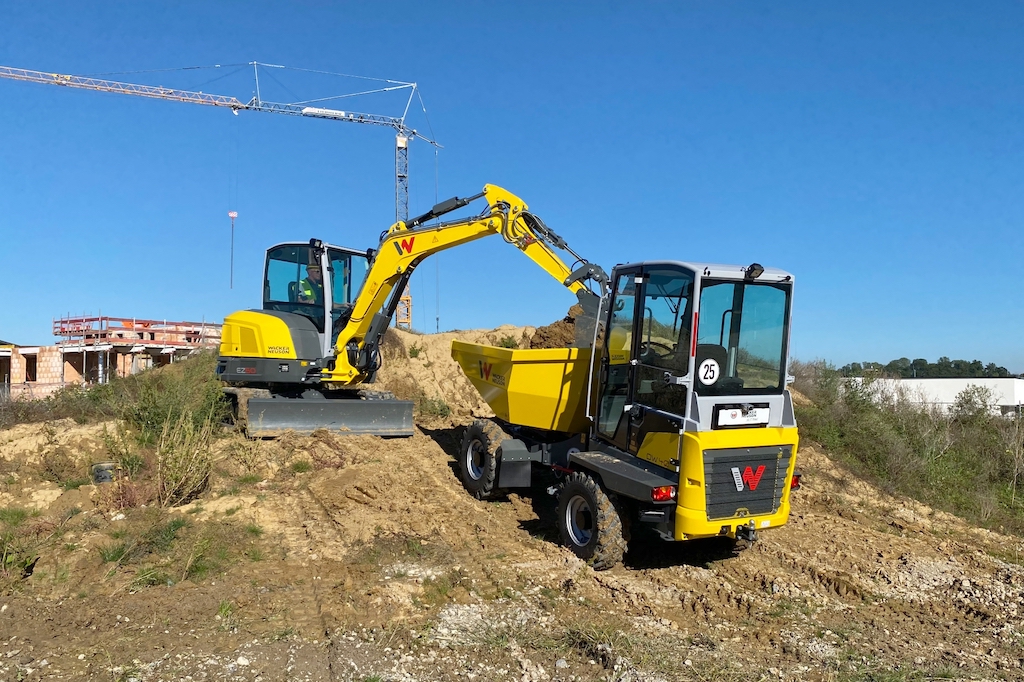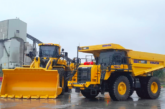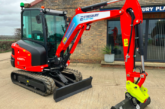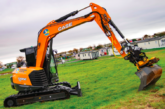The Executive Board of the Wacker Neuson Group is looking towards the future with a sense of optimism after a challenging year in 2020.
Given the positive prospects for the construction and agricultural industries, coupled with a significantly higher order backlog relative to the previous year, the Executive Board expects to report growth in all three reporting regions in 2021 and across its three business segments of light equipment, compact equipment and services. Revenue is expected to amount to between EUR 1,700 million and EUR 1,800 million (2020: EUR 1,615.5 million) with an EBIT margin between 8.0 and 9.5 percent (2020: 4.7 percent).
“COVID-19 presented all of us with sizeable challenges over the past year, and the pandemic is far from over. Nevertheless, all signs are pointing towards renewed growth in 2021 and we are very confident about the coming weeks and months. Our customers are busy and our order books are well filled,” explains Kurt Helletzgruber, CEO and CFO of the Wacker Neuson Group. “We worked hard on improving efficiency levels across the entire Group last year. We are not yet where we want to be but I am very optimistic about the development of our profitability for 2021 and beyond.”
In addition to the continued negative effects of the coronavirus crisis, the Executive Board feels that the supply chain in particular is currently a source of risk. The situation in many areas is already under considerable pressure due to the restrictions caused by the pandemic and the overall uptick in demand. In addition, the Group is facing sharp increases in procurement prices, for example for steel.
Dr. Karl Tragl appointed new Chairman of the Executive Board and CEO
Dr. Karl Tragl will take on the role of Chairman of the Executive Board and CEO of Wacker Neuson SE effective June 1, 2021. He most recently served as CEO of the Diehl Group, a global technology group with around 17,000 employees. “With Dr. Tragl, we have won an experienced and international leader with an in-depth understanding of the mechanical engineering industry to steer our company,” explains Hans Neunteufel, Chairman of the Supervisory Board of Wacker Neuson SE. He continues: “He has a wealth of experience in internationalization, which we can leverage to capitalize even more effectively on opportunities that arise for us on the global market.” Alongside his responsibilities as Chairman of the Executive Board, Karl Tragl will be responsible for the areas of strategy, M&A, legal & compliance, human resources, investor relations, corporate communication, sustainability and real estate in his role as CEO of Wacker Neuson SE.
Business in 2020 heavily impacted by COVID-19
The Wacker Neuson Group reported significant revenue losses in the past fiscal year as a result of the effects of the coronavirus pandemic. The protective measures implemented by many countries, institutions and companies interrupted construction activity and compromised supply chains, particularly during the first half of the year. Widespread lockdowns and major uncertainties about how the pandemic would evolve had a markedly negative impact on customers’ investment behavior and also on the Wacker Neuson Group’s business situation. The Group reported revenue of EUR 1,615.5 million, which is a decrease of 15.0 percent relative to the previous year (2019: EUR 1,901.1 million).
At EUR 1,289.7 million, revenue in the Europe segment fell 6.5 percent relative to the previous year (2019: EUR 1,379.0 million). Business developed more positively in Germany, Austria and Switzerland, where the Group benefited from its particularly dense network of its own sales affiliates and dealer partners. The Group was able to soften the downturn in new equipment sales with revenue gains in the services segment. Business with agricultural equipment manufactured by the Group brands Kramer and Weidemann also had a stabilizing effect here with revenue amounting to EUR 304.3 million, which was a drop of 1.9 percent (2019: EUR 310.2 million).
The Americas was particularly hard hit by COVID-19 and revenue for this region fell 41.2 percent to EUR 270.4 million (2019: EUR 459.5 million). This was primarily attributable to a strong reluctance to invest among major customers and rental chains, who demonstrated a more pronounced scaling back than the overall market.
In the Asia-Pacific region, revenue decreased to EUR 55.4 million relative to the previous year (2019: EUR 62.6 million). Revenue losses were concentrated in the first quarter in particular, as the Chinese plant closed down for several weeks in connection with COVID-19. Whereas the situation in China and Australia rapidly improved in the following months, it showed no signs of easing in countries in Southeast Asia.

Profit impacted by downturn in revenue and allowances for doubtful receivables
Profit before interest and tax (EBIT) for the period under review amounted to EUR 75.5 million (2019: EUR 153.1 million), which corresponds to an EBIT margin of 4.7 percent (2019: 8.1 percent). The downturn in earnings was primarily attributable to the drop in revenue, as well as allowances for doubtful receivables in the total amount of EUR 33.3 million. In addition, the Group had already completely written down goodwill attributed to the US subgroup in the amount of EUR 9.2 million in the first half of the year. One-off expenses amounting to EUR 9.1 million were also incurred in relation to the Group-wide program to reduce costs and increase efficiency, which was approved in January 2020. At the same time, however, the Group was able to partly offset the negative effects on earnings by rapidly implementing measures in response to the sharp drop in demand, including a significant reduction in operating costs. A more favorable product mix – reflecting a higher share of the profitable services segment in total revenue – also lent positive momentum.
Significant reduction in net working capital gives strong boost to free cash flow
The Group significantly reduced net working capital in 2020. As part of its Strategy 2022 initiative, the Group aims to reduce net working capital to 30 percent of revenue or lower. At the close of the year, the ratio amounted to 30.8 percent (December 31, 2019: 40.1 percent). This is primarily attributable to a sharp reduction in inventory and a drop in trade receivables. As a result, the Group reported extremely positive development of free cash flow, which amounted to EUR 329.0 million in 2020. In the previous year, a sharp rise in net working capital had resulted in a clearly negative cash flow (2019: EUR -115.7 million).
Net financial debt at lowest level in nine years, increase in equity ratio
The Group utilized the positive development of free cash flow in a number of ways, including to repay current liabilities. This pushed up the equity ratio to 57.3 percent (December 31, 2019: 55.8 percent). Net financial debt fell 68.6 percent and amounted to EUR 137.9 million at the close of 2020, which is the lowest level since 2011 (December 31, 2019: EUR 439.0 million). Gearing improved to 11.3 percent (December 31, 2019: 35.8 percent).
Focus on efficiency improvements
The Executive Board continues to focus in particular on improving profitability. The ‘Xto1’ organizational project is an important pillar supporting the Group’s efforts here. “The Wacker Neuson Group has expanded considerably in recent years. Our organization has grown with us during this time without undergoing any major structural changes. This has not always been ideal from an efficiency or profitability perspective. We need a transparent, agile, high-performance structure with clearly defined roles and responsibilities if we are to meet the goals we have set out in our Strategy 2022 initiative.
‘Xto1’ is our roadmap for turning 5,500 employees across the globe into a cohesive, strong unit,” says Helletzgruber. As part of Strategy 2022, the Group is aiming to achieve an EBIT margin of over 11 percent, increase revenue beyond EUR 2 billion and reduce net working capital to 30 percent of revenue or lower. After reporting double-digit growth rates in fiscal 2017, 2018 and 2019, the Wacker Neuson Group suffered a sharp dip in its growth path in 2020. This led the Group to announce in the fall that it would be achieving its strategic goals one to two years later than originally planned. “The long-term trends in our industry remain unchanged and continue to offer major opportunities for our Group. To this end, we aim to further expand our strong market position and will continue to impress our customers with innovative solutions moving forward. I firmly believe that we will achieve our goals,” concludes Helletzgruber.
Dividend proposal at the AGM
At the Annual General Meeting in June 2020, shareholders resolved to suspend the dividend payout in order to strengthen the financial position of the Wacker Neuson Group during the coronavirus pandemic. For fiscal 2020, the company envisages an attractive dividend for shareholders once again. The Executive Board and the Supervisory Board will jointly propose a dividend of EUR 0.60 per share to the AGM in May.
Share buyback program approved
On March 18, 2021 the Executive and Supervisory Board resolved to launch a share buyback program (“Share Buyback Program 2021”). Within the framework of the Share Buyback Program 2021, up to a total of 2,454,900 shares (corresponding to up to 3.5 percent of the company’s share capital) may be repurchased between April 1, 2021 and April 30, 2022 for a maximum total purchase price (excluding incidental acquisition costs) of EUR 53 million. The treasury shares will be primarily used by way of consideration in connection with the acquisition of companies or to implement participation programs for Group employees and Executive Board members.









